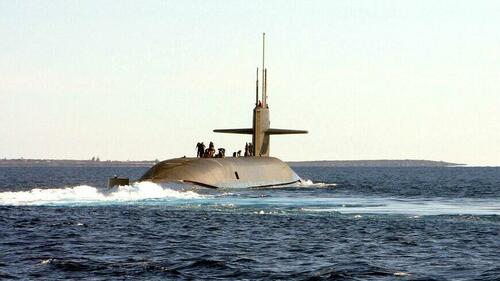
The US military build-up off Israel's coast and especially Central Command's (CENTCOM) willingness to advertise it openly, is cause for serious alarm in terms of the prospect for yet more Washington intervention in yet another major Middle East war.
In a very rare statement, CENTCOM on Sunday evening announced that an Ohio-class submarine has arrived in the region. The US submarine, which is both nuclear-powered and capable of carrying nuclear warheads, has arrived in an "area of responsibility" which includes the eastern Mediterranean, Red Sea, Persian Gulf, and Gulf of Oman. It is unknown and undisclosed precisely what types of advanced weapons it is carrying.

It is the most sophisticated that exists in the US Navy arsenal. Key to the secretive nature of such an advanced sub's movements is the ability to traverse the seas undetected, without any rival or enemy powers having any idea where it is located, thus the Pentagon almost never puts out statements confirming where a nuclear sub is at any given time.
And yet CENTCOM didn't just issue a statement, it went so far as to publish a photograph which openly advertises its more precise whereabouts. Israeli media said this is clearly to send a strong "message" to Iran and its proxies:
While the US announcement was scarce on details, it was accompanied by an image that appeared to show a submarine in Egypt’s Suez Canal.
The arrival of the submarine in the region was apparently part of the same strategy that has seen the Pentagon dispatch two carrier strike groups in order to deter Iran and its proxies — not least the Lebanon-based Hezbollah terror group — from attacking Israel amid its war against Hamas.
US Navy's Ohio-class cruise missile submarine USS Florida (SSGN-728) transit Suez Canal on November 5. pic.twitter.com/c5JWAJmdhF
— Clash Report (@clashreport) November 6, 2023
Ohio-class submarines are also reportedly capable of carrying up to 154 Tomahawk cruise missiles if outfitted for guided missiles, and is part of America's "nuclear triad" of atomic weapons.
Newsweek reviews of the navy's Ohio classification of sub capabilities as follows:
The U.S. Navy's Ohio-class offering consists of 14 ballistic missile submarines (SSBNs) and four cruise missile submarines (SSGNs), the latter converted to fire Tomahawk cruise missiles rather than their original nuclear-armed ballistic missile loadout.
One SSGN can be armed with 154 Tomahawk cruise missiles, significantly more than the number carried by U.S. guided-missile destroyers and attack submarines. Tomahawk missiles can carry up to a 1,000-pound high-explosive warhead out to around 1,500 miles.
The US military has also been showing off its significant assets in Middle East skies as well, with CENTCOM simultaneously issuing photos of B-1 bombers which are newly deployed in the area...
On November 5, 2023, a U.S. Air Force B-1 Lancer begins aerial refueling from a KC-135 Stratotanker assigned to the 912th Expeditionary Air Refueling Squadron while conducting a Bomber Task Force mission over the U.S. Central Command area of responsibility. The mission was… pic.twitter.com/HQQn9EECIS
— U.S. Central Command (@CENTCOM) November 5, 2023
One scenario in which the Pentagon is more likely to directly intervene in the Gaza situation militarily is if Hezbollah opens a full war front on Israel's northern border. Hezbollah chief Hassan Nasrallah in a major Friday speech, his first since the conflict began, stressed that "all options are open on our Lebanese front" and specifically addressed the US build-up off the Lebanese and Israeli coasts, saying "Your fleet in the Mediterranean do not scare us... we are ready to face the fleet you threaten us with."
Iran's foreign ministry has also issued a fresh statement warning that if a ceasefire in Gaza isn't reached soon, and if Israel's attacks on civilians continue to escalate, Americans in the region will be "hit hard" - no doubt a direct threat against US bases in Iraq and Syria.
The US military build-up off Israel’s coast and especially Central Command’s (CENTCOM) willingness to advertise it openly, is cause for serious alarm in terms of the prospect for yet more Washington intervention in yet another major Middle East war.
In a very rare statement, CENTCOM on Sunday evening announced that an Ohio-class submarine has arrived in the region. The US submarine, which is both nuclear-powered and capable of carrying nuclear warheads, has arrived in an “area of responsibility” which includes the eastern Mediterranean, Red Sea, Persian Gulf, and Gulf of Oman. It is unknown and undisclosed precisely what types of advanced weapons it is carrying.

It is the most sophisticated that exists in the US Navy arsenal. Key to the secretive nature of such an advanced sub’s movements is the ability to traverse the seas undetected, without any rival or enemy powers having any idea where it is located, thus the Pentagon almost never puts out statements confirming where a nuclear sub is at any given time.
And yet CENTCOM didn’t just issue a statement, it went so far as to publish a photograph which openly advertises its more precise whereabouts. Israeli media said this is clearly to send a strong “message” to Iran and its proxies:
While the US announcement was scarce on details, it was accompanied by an image that appeared to show a submarine in Egypt’s Suez Canal.
The arrival of the submarine in the region was apparently part of the same strategy that has seen the Pentagon dispatch two carrier strike groups in order to deter Iran and its proxies — not least the Lebanon-based Hezbollah terror group — from attacking Israel amid its war against Hamas.
US Navy’s Ohio-class cruise missile submarine USS Florida (SSGN-728) transit Suez Canal on November 5. pic.twitter.com/c5JWAJmdhF
— Clash Report (@clashreport) November 6, 2023
Ohio-class submarines are also reportedly capable of carrying up to 154 Tomahawk cruise missiles if outfitted for guided missiles, and is part of America’s “nuclear triad” of atomic weapons.
Newsweek reviews of the navy’s Ohio classification of sub capabilities as follows:
The U.S. Navy’s Ohio-class offering consists of 14 ballistic missile submarines (SSBNs) and four cruise missile submarines (SSGNs), the latter converted to fire Tomahawk cruise missiles rather than their original nuclear-armed ballistic missile loadout.
One SSGN can be armed with 154 Tomahawk cruise missiles, significantly more than the number carried by U.S. guided-missile destroyers and attack submarines. Tomahawk missiles can carry up to a 1,000-pound high-explosive warhead out to around 1,500 miles.
The US military has also been showing off its significant assets in Middle East skies as well, with CENTCOM simultaneously issuing photos of B-1 bombers which are newly deployed in the area…
On November 5, 2023, a U.S. Air Force B-1 Lancer begins aerial refueling from a KC-135 Stratotanker assigned to the 912th Expeditionary Air Refueling Squadron while conducting a Bomber Task Force mission over the U.S. Central Command area of responsibility. The mission was… pic.twitter.com/HQQn9EECIS
— U.S. Central Command (@CENTCOM) November 5, 2023
One scenario in which the Pentagon is more likely to directly intervene in the Gaza situation militarily is if Hezbollah opens a full war front on Israel’s northern border. Hezbollah chief Hassan Nasrallah in a major Friday speech, his first since the conflict began, stressed that “all options are open on our Lebanese front” and specifically addressed the US build-up off the Lebanese and Israeli coasts, saying “Your fleet in the Mediterranean do not scare us… we are ready to face the fleet you threaten us with.”
Iran’s foreign ministry has also issued a fresh statement warning that if a ceasefire in Gaza isn’t reached soon, and if Israel’s attacks on civilians continue to escalate, Americans in the region will be “hit hard” – no doubt a direct threat against US bases in Iraq and Syria.
Loading…




